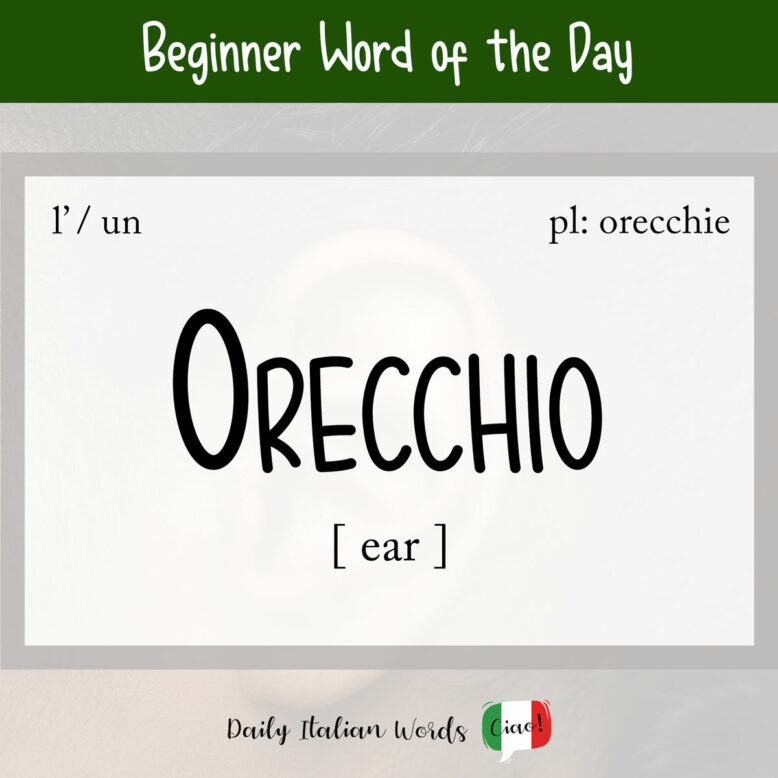Today we’re going to be talking about a very important body part: the ear!

Before we begin, it’s important to clarify that there are two forms that derive from the Latin auriculam: the masculine noun orecchio and the feminine noun orecchia.
The masculine singular orecchio is the most common form used to indicate the organ itself. For example:
L’orecchio è l’organo del corpo umano preposto alla funzione uditiva.
The ear is the organ of the human body responsible for auditory function.
Mi sono fatto il piercing all’orecchio destro.
I got my right ear pierced.
The ear is divided into three main parts: l’orecchio esterno (the outer ear), l’orecchio interno (the inner ear) and l’orecchio medio (the middle ear). It is very common for people, especially young children, to suffer from un mal d’orecchio (an ear ache).

Those new to Italian may be surprised to learn that orecchio has not one, but two plurals: the masculine orecchi, a less common form used to indicate the ears considered individually, and the far more common orecchie, the feminine formed used to indicate a pair of ears. Consider the following examples:
Ha comprato cinque orecchi di maiale da dare al suo cane.
He bought five pig ears to give to his dog.
Here we are referring to five individual ears, probably taken from different pigs, so it makes sense to use orecchi.
In this second example, however, we are talking about an individual’s pair of ears, as if they were one entity. For this reason, we must use the feminine plural orecchie.
Il bimbo aveva le orecchie rosse per il freddo.
The boy had red ears due to the cold.

Then we come to the singular feminine form orecchia. Although this form hardly ever indicates the organ, it is regularly used to denote things that protrude in a similar manner to an ear. For example, in the phrase fare l’orecchia alla pagina (lit. to make the ear on the page), orecchia refers to the corner of a page folded over as a bookmark. The plural form of orecchia is always orecchie.
Here are the various definite and indefinite articles that should accompany orecchio, orecchia and their plural forms:
- l’orecchio = the ear
- gli orecchi = the ears
- un orecchio = an ear
- degli orecchi = (some) ears
- l’orecchia = the ear
- le orecchie = the (pair of) ears
- un’orecchia = an ear
- delle orecchie = (some) ears

Idiomatic expressions featuring ‘orecchio’
Orecchio and its masculine plural form orecchi often appear in figurative expressions in Italian. In fact, orecchi has far more figurative than literal uses, whereas the feminine plural orecchie is almost always used in a literal sense. Let’s take a look at some of the most common idioms, many of which may already be familiar to you as an English speaker!
Note: Because there is such an abundance of ear-related idioms in Italian, we’ve opted to include a limited selection in this article. Those interested can find a very complete list in the Repubblica IT-EN dictionary.
Essere tutt’orecchi
Literal translation: to be all ears
English meaning: to be all ears
Essere a portata d’orecchio / fuori portata d’orecchio
Literal translation: to be within reach of the ear / to be out of reach of the ear
English meaning: to be within earshot / to be out of earshot
Anche i muri hanno le orecchie
Literal translation: even the walls have ears
English meaning: the walls have ears
Avere (un ottimo) orecchio
Literal translation: to have a good ear
English meaning: to have a good ear for music
Tirare le orecchie (a qualcuno)
Literal translation: to pull the ears (to someone)
English meaning: to give someone an earful
Avere l’orecchio fine
Literal translation: to have a fine ear
English meaning: to have a sharp sense of hearing
Essere duro d’orecchio
Literal translation: to be hard of the ear
English meaning: to be hard of hearing
Prestare orecchio
Literal translation: to lend ear
English meaning: to lend an ear
Mettere una pulce nell’orecchio di qualcuno
Literal translation: to put a flea in someone’s ear
English meaning: to drop someone a hint
Fare orecchio da mercante
Literal translation: to do a merchant’s ear
English meaning: to turn a deaf ear
Heather Broster is a graduate with honours in linguistics from the University of Western Ontario. She is an aspiring polyglot, proficient in English and Italian, as well as Japanese, Welsh, and French to varying degrees of fluency. Originally from Toronto, Heather has resided in various countries, notably Italy for a period of six years. Her primary focus lies in the fields of language acquisition, education, and bilingual instruction.


